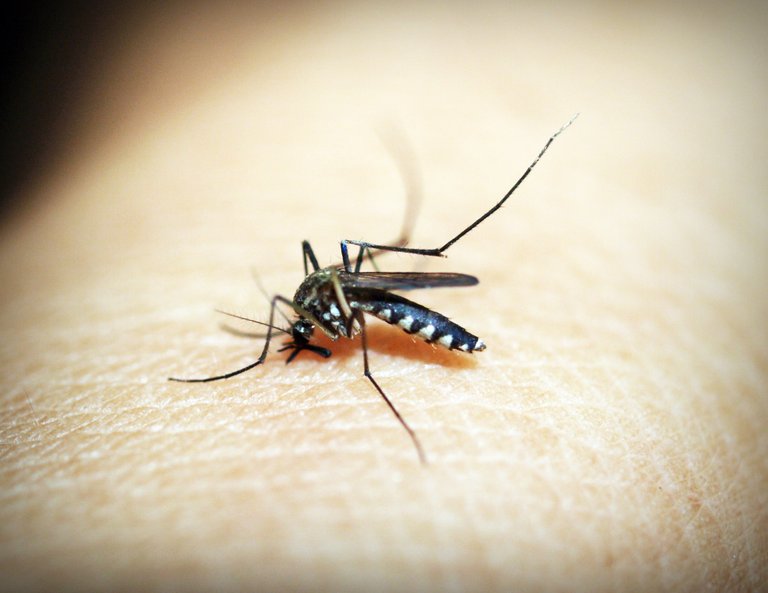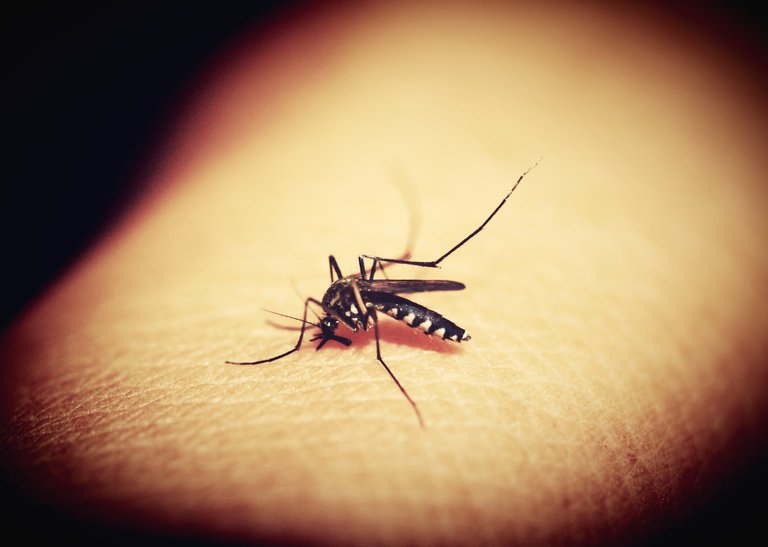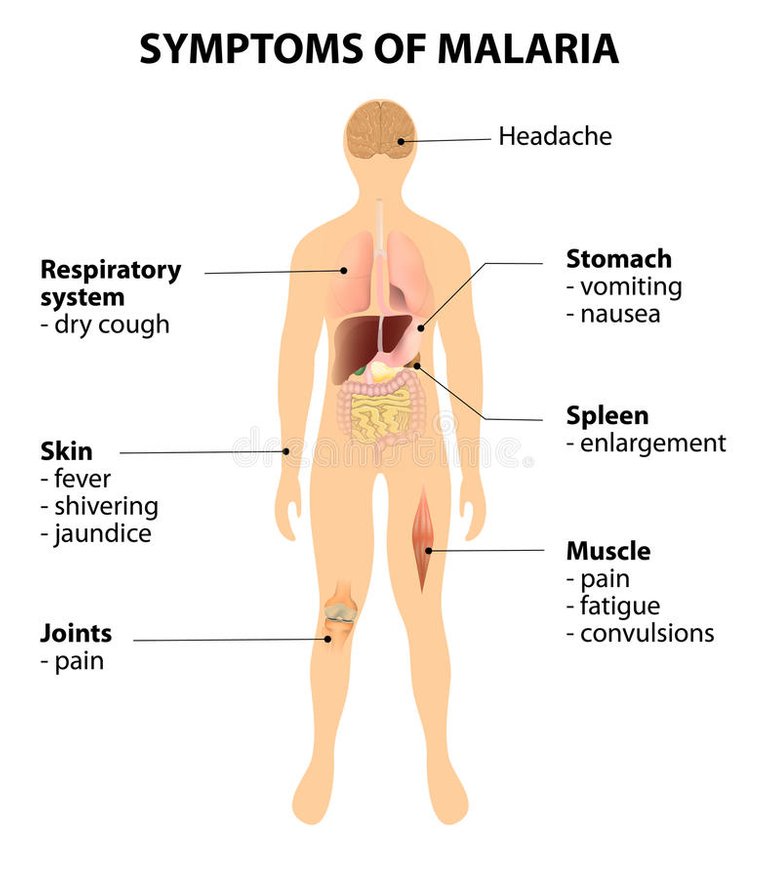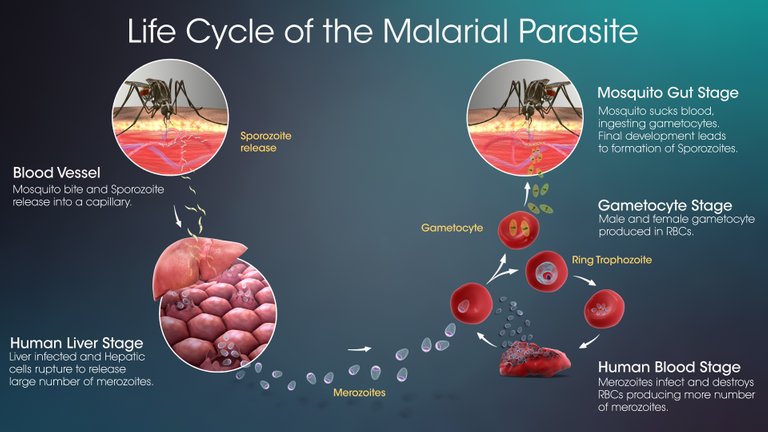OVERVIEW AND STATISTICS

Source
Malaria is the most common disease in most parts of the world. According to a statistics conducted in 2015, it was eat mated that about half of the world's population is at risk of this disease with about 429,000 death cases. The most vulnerable to this disease are the young children below age 5, pregnant women and non immune travelers who move from the parasite-free countries to places where these parasites survives. These people, when they encounter the malaria parasite often die easily if immediate treatment is not received.
WHAT IS MALARIA?
Malaria is a disease that is caused by the malaria parasite transmitted to individuals through the bite of the infected female anopheles mosquito.
LIFE CYCLE
As a vector for this parasite, the mosquito harbours the parasite (sporozoits) in its salivary gland and inject it into the body whenever it sucks blood for nourishment of its eggs. Whiles this female anopheles mosquito sucks the blood, it then takes the gametocytes from the blood of the infected person. During the injection of the sporozoits into the individual, they first attack the hepatocytes (liver cells) after which they develop into schizonts. As they mature, they move to the blood stream where they infect red blood cells.
As the parasites infect the red cells, they divide into merozoites which then rapture the red cells to release more merozoites for greater infestation of red cells leading to decrease in red cells in a condition known as anemia. The erythrocytic (red blood cells) stage is when the symptoms of the disease occurs in the individual. As the merozoites mature, they form male and female gametocytes which are then ingested by the mosquito whenever it comes for blood meal. Inside the mosquito, it there is a fusion of the male and female gametocytes to form a zygote. This zygote becomes motile and then migrates to the midgut where it turns into oocytes which then raptures to release the sporozoits which are stored in the salivary gland for another injection.
OTHER SPECIES OF THE PLASMODIUM PARASITE

Source
There are more than 100 species of the plasmodium parasite but those that infect humans are four namely P.falciparum,P.ovale,P.malariae,P.vivax.There is a newly discovered specie that is also known to affect humans. It's called plasmodium knowlesi, which was first found in Malaysia in 2007 when a Finnish tourist was seen to have it's infection.
P. falciparum: It's the most common specie on Africa. It cause the most dangerous form of malaria because it has highest rate of multiplication in the human body. Because of this, it normally lead to anemia. Upon prolonged infestation, it can cause clog in the blood vessels of the brain leading to cerebral malaria.
P. Vivax: this parasite is mostly found in Asia and some parts of Africa. It has a hypnozoites which can remain dormant in the liver and resurface after some time. This relapses is also seen in some infestation of the ovale.
P. Ovale: plasmodium ovale also affect most of West Africans . It's biologically and morphologically similar to that of P. Vivax.
P. Malariae: this type of specie has the longest cycle, known as tertian. If not treated in the early stages, it can become chronic. It can also become long lasting and may lead to a lifetime disease.
CAUSES OF MALARIA
As I have said earlier in the overview, it's caused by the bite of the infected female anopheles mosquito. But I can also be transmitted by:
Transfusion: this occurs when an infected person donates blood
Organ transplant: an organ from infected individual to another person can transfer the parasite.
Child birth: this happens when the mother passes the parasite to the baby. This case is known as congenital malaria.
Sharing of needles and sharp object.
SYMPTOMS OF MALARIA

The symptoms occur from 10 days to four weeks of infestation. Among the many symptoms are
- headache
- high fever
- chills
- anemia
- diarrhea
- muscle pain
- nausea and vomiting
- convulsions
OTHER LIFE-THREATENING COMPLICATIONS OF MALARIA
brain damage due to the clogging if blood in the blood vessels of the brain as in cerebral malaria
Pulmonary edema which is the accumulation of fluid in the lungs. This can also cause difficulty in breathing.
It can cause kidney, liver and spleen failure.
Anemia and hypoglycemia
TREATMENT OF MALARIA

Source
During the treatment of malaria, a blood sample of the patient is taken for laboratory tests. There are two main options for the Medical Laboratory Scientist, one is to do a rapid diagnostic test (RDT) to check for the presence of the parasite. But the more accurate way is to perform a blood film so that the morphology and the stage of infestation can be determined for a better medication. If the parasite persist, the medical doctor may prescribe more than one medication.
WAYS OF PREVENTING MALARIA
Ensuring proper sanitation. This will reduce the conditions that the vector needs to survive in its habitats. It can be done by clearing of bushes around and draining of stagnant water
Also, sleeping under mosquito nets to prevent their bites.
Using mosquito repellent to prevent them from feeding on your blood.


Wow! Its is amazing to see that @sc-g finds it thoughtful to consider other aspects of parishioners' wellbeing other than the spiritual. Sometimes, a little knowledge would have saved the believer the stress of praying ignorantly.
It is cheaper to prevent malaria than cure it.
Thank you @gadol for sharing this.
Thanks @uyobong for this amazing contribution
I already possess some facts about malaria but @sc-g through @gadol has added more knowledge to what I already have. Thank you @sirknight for #steemchurch
Thanks for such a great contribution
Knowledge is indeed precious it is for this reason why it was said for lack of knowledge my people perish, thanks for sharing bro
Knowlede is indeed power...thanks
Nice article @gadol very well done
Thank you for appreciating @gadol and stay bliss
The health of the church is the sole concern if it members thanks @sc-g for sharing.
Thanks @bigssam
Oh what write up and knowledgeably information for all ....Thanks @gadol for enlightening us on malaria.
I'm so glad about the educative and informative post which the steemchurch Ghana has been sharing to ensure parishioners well being. Malaria is killing many especially in Africa and I'm sure this post will be very helpful to many on the new to stay safe from malaria.